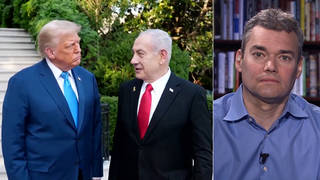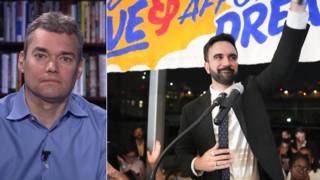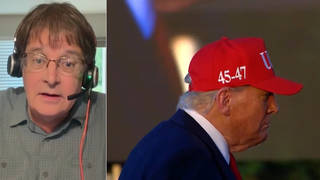
Stanley Tookie Williams is dead. He was executed at 12:35 am PT by lethal injection at San Quentin State Prison. He was 51 years old. A co-founder of one of the country’s most notorious street gangs, the Crips, Williams spent 24 years on death row after being convicted of four murders. During this period he became a Nobel Peace Prize nominee, children’s author and a vocal advocate against gang violence. He maintained his innocence up until his death. Williams’ fate was sealed Monday afternoon when California Gov. Arnold Schwarzenegger rejected a final appeal for clemency. We play excerpts of a press conference where witnesses describe the execution and we hear reactions from his attorney, the NAACP and the Rev. Jesse Jackson. [includes rush transcript]
Stanley Tookie Williams is dead. He was executed December 13th at 12:35 a.m. Pacific time by lethal injection at San Quentin State Prison. He was 51 years old. A co-founder of one of the country’s most notorious street gangs, the Crips, Williams spent 24 years on death row after being convicted of four murders.
During this period he became a Nobel Peace Prize nominee, children’s author and a vocal advocate against gang violence. He maintained his innocence up until his death.
The execution was attended both by the victims’ families and several of Williams’ supporters. After he was pronounced dead, several reporters who were witness to the execution held a press conference and described what happened.
- Press conference, December 13th
A crowd over 2,000 people, most of them opposed to Williams’ execution, demonstrated outside the prison. Williams’ fate was sealed Monday afternoon when California Governor Arnold Schwarzenegger rejected a final appeal for clemency. Another plea to the Supreme Court was rejected later in the evening. Schwarzenegger also turned down a last-minute request to grant a stay of execution despite the emergence of four new witnesses Williams’ lawyers argued could help exonerate him.
Williams’ defense team immediately denounced the judgment, and vowed to press their clients” case until the final moment. Williams” attorney Jonathan Harris held a press conference by phone after the clemency appeal was denied.
- Jonathan Harris, December 12th, telephone press conference.
Williams became one of the most celebrated death row cases the country has seen in years, championed by prominent political and community figures like the Reverend Jesse Jackson, Professor and Activist Angela Davis, and Sister Helen Prejean, and entertainers such as the rap artist Snoop Dogg and the actor Jamie Foxx. This is Alice Huffman of the NAACP.
- Alice Huffman, California NAACP President.
The Reverend Jesse Jackson was one of the last people to meet with Stanley Tookie Williams. He also denounced the decision by Governor Schwarzenegger to deny Williams clemency.
- The Rev. Jesse Jackson, December 12th, outside San Quentin prison, California.
Transcript
AMY GOODMAN: After he was pronounced dead, several reporters who were witness to the execution held a news conference and described what happened.
REPORTER 1: Well, you have somewhat obstructed views. And we were discussing on the way back who saw and who heard what. So I think you might get something slightly different from each of us. He came in without any kind of resistance shortly after 12:00, it seemed. He was helped onto what I guess is a converted dentist chair and was strapped down and at no point did he seem to give any kind of resistance whatsoever. He did, while they were tapping his veins, lift his head several times to look around at people. He seemed, for the most part, to be looking over to his section where there appeared to be some of his supporters. At one point he looked directly over at us. It was hard to see if he was just looking at the press, in general, or anybody particular. And he was declared dead at 12:35.
JOHN SIMERMAN: They had some trouble with the second I.V., which was in the left arm. It took them — it may have been ten minutes to deal with that. Williams, at one point, grimaced or looked almost out of frustration or —- at the difficulty there. It took 'til 12:22 thereabouts before a female guard gave the announcement that the execution would begin. So there's a 13— or 14-minute actual execution, the first part of which he was lifting his head, and then it fell again down to the — I guess you call it a pad. Did that a few times, breathing pretty heavily, and then you would see sort of a rise in sort of his stomach area up and down a few times, or more than a few times, I guess, and then, after a few minutes, his breathing slowed, and then you didn’t see anything for several minutes, and everybody was sort of attentive, watching this lifeless body.
KEVIN FAGAN: This is the sixth one I have seen here at San Quentin, and I have to say this was very different. The most notable thing was that Williams had supporters at the back of the room. Ms. Becnel was among them, I understand. We could see them, and throughout the last part of the execution — or preparing him when he was still conscious, they gave what looked like black power salutes several times to him, one man and two women. And most strikingly at the end of the execution, as those three were heading out, they yelled, “The State of California just killed an innocent man!” which is the first time I ever heard any outburst in the death chamber there. And the folks who were there on behalf of the victims appeared — they were stony. They were very impassive. But at the very end, when those three yelled that out, Dora [sic] Owens, the step-mom of one of his victims, began to cry. — Yeah, Lora, I’m sorry. Lora. And that was different. That was a very emotional element of this particular execution.
TONY LOPEZ: I had a good look at the Williams’s supporters. Other than raising their fists in the air, at times they he blew kisses to him. They said, they whispered, they worded, “I love you. God bless you.” Stanley Williams was speaking a lot throughout this process. We don’t know what he was saying. His head was tilted to the left where his contingent was, and he was talking a lot, it appeared. Mostly he talked about the victim’s stepmother, Miss Owens, and not until the very end did she show any sort of emotion. She was looking just straight at Williams the entire time, did not move whatsoever. But the Williams contingent did move around a lot and, as was said, they had that outburst at the end as they left the room.
KIM CURTIS: I had an extremely obstructed view, so I don’t have a lot to add other than it seemed to me that it was taking much longer than Williams thought it would. He kept lifting his head, shaking his head, putting it back down, almost as if it seemed like disgust, to me, and frustration. And I thought he said — I don’t know if anyone else heard this, but — 'You doing that right?' Did anyone hear that but me?
KEVIN FAGAN: It was very hard to hear in there, the fact that the glass is super thick.
BRIAN ROONEY: I was struck by two things. I was struck by what a personal process it was and that all of the people attending to him had their hands on him most of the time. One guard, near the right side of his head, in particular, was touching his upper arm a lot of the time, I think in an effort to comfort him. There was a lot of — quite a bit of talking. Tookie would talk to the people attending, and at times they spoke back to him. He lifted his head a lot, looked around. I was struck by how long it took. It was at least 22 minutes from when he entered the room to when they read the death warrant. There was just an awful lot of sticking needles and taping things down, and he raised his head several times and spoke to them. He look exasperated at the length of the process of doing this. And by my watch, it was 36 minutes and 15 seconds from when he walked in the room alive to when they declared him dead.
MODERATOR: We’ll take a few questions if any of you have questions for these individuals.
QUESTION: Were you able to see if he had any last words when the warden asked him that question, or do you know?
BRIAN ROONEY: We were told his last words were issued several hours ago, given to the warden. And you’ll hear those later, but there were no official last words in our presence.
QUESTION: How many relatives of the victims were actually there? Do you know?
KIM CURTIS: We don’t know.
KEVIN FAGAN: It was hard to tell. The count was supposed to be five, and there seemed to be five people who might have been representatives of the victims but, you know, you can’t ask any questions in there.
REPORTER 1: The witnesses are not identified to us.
TONY LOPEZ: And of the victims’ family, in terms of emotion, really, it just wasn’t until the very end, like we said. The rest just sat there and stood and —
QUESTION: Can you clarify the interaction that was taking place between Tookie Williams and his supporters?
KEVIN FAGAN: Yeah, they were very intent. Mr. Fleming, I believe, was one of his attorneys who was in there. He and another attorney, then the two women and the other man were staring at him most of the time, and they looked very frustrated that it was taking so long, particularly the two women, Ms. Becnel and her friend. They stood apart from the others, and they stared very intently, and at one time they were praying, like this, and then, you know, of course, several times they raised their fists up. And he raised up, like Steve was saying and a few others, he raised up and tried to look at them quite a lot. And it seemed like toward the very end he was trying to keep his head up — did you see this, Tony?
TONY LOPEZ: Yeah.
KEVIN FAGAN: He was trying to keep his head up as long as he could, until the first drugs hit him.
QUESTION: And did they say anything to each other? I mean, was there verbal communication?
TONY LOPEZ: Between Williams’s supporters and Williams himself, yeah. They were mouthing things to each other.
QUESTION: Like?
TONY LOPEZ: I could only see just the Williams contingent, saying things like “I love you. God bless you.”
JOHN SIMERMAN: In the beginning, he had his head turned to the left toward them, toward presumably Barbara Becnel. He had his glasses on the whole time. He kept them on, and he kept looking over there, looking over there. Only once did he really turn to the right where we were and sort of look around to see — maybe to see who was there or what he could see.
QUESTION: And who was it that did the shouting, 'You just killed an innocent man'? How did that go down?
KEVIN FAGAN: That was right as they left. As soon as they announced the death warrant, the death notice, people started filing out, and his supporters were the first to go out. And just as they were heading out the gate, they turned back, three of them, and yelled this.
AMY GOODMAN: An excerpt of the news conference held after the execution of Stanley Tookie Williams early this morning. A crowd of over 2,000 people, most opposed to Williams’s execution, protested outside. We’ll hear from one of those there, Angela Davis, after this break.
[break–music: Movement in Motion “Rumi”]
AMY GOODMAN: Stanley Tookie Williams’s fate was sealed Monday afternoon when Governor Arnold Schwarzenegger rejected his final appeal for clemency. Another plea to the Supreme Court was rejected later in the evening. Schwarzenegger also turned down a last-minute request to grant a stay of execution, despite the emergence of four new witnesses Williams’s lawyers argued could help exonerate him. Williams’s defense team immediately denounced the judgment and vowed to press their client’s case until the final moment. Williams’s attorney, Jonathan Harris, held a news conference by phone after the clemency appeal was denied.
JONATHAN HARRIS: What these people have come forward and said is in accordance with and corroborates what Stanley Williams has been saying for 25 years, which is that he is innocent. Now, the governor has denied our petition for clemency on the grounds that, in his view, Stanley Williams is guilty, and his refusal to admit and confess to these crimes denies his personal atoning. And I asked the governor to give us a stay, to give us time to investigate these men who have come forward. They have offered us the names of other individuals who would corroborate those statements. We are actively looking for those people. In fact, we are talking to one of those people this afternoon, and we will be filing a request with the governor this afternoon for a stay, while we continue to investigate these claims of innocence.
Beyond that, California has a moratorium legislation pending, AB 1121, which is going to be voted on in January, and this moratorium legislation will put a moratorium on all death penalties in California, while a California Commission on the Fair Administration of Justice, a bipartisan commission looks at the application of the death penalty in California. It would be a sad, tragic and dishonorable day for California if Stanley Williams were to be the last person executed before this moratorium went into effect. And we are calling on the governor to stay the execution, pending a vote on that bill. Thank you very much.
AMY GOODMAN: That was Jonathan Harris, attorney with the defense team of Stanley Tookie Williams, speaking on Monday. Williams became one of the most celebrated death row cases the country has seen in years. Championed by prominent political and community figures, like the Reverend Jesse Jackson, professor and activist Angela Davis, Sister Helen Prejean, and entertainers, such as the rap artist Snoop Dogg and the actor Jamie Foxx. This is Alice Huffman of the NAACP.
ALICE HUFFMAN: I must tell you we are deeply saddened by the governor’s decision to not grant clemency to Stanley Tookie Williams. We believe this is a serious blow to our efforts to eliminate gangs and to create a safer environment. We believe that Stanley Tookie Williams’s life has value above any notion of an eye for an eye, which is the premise of the death penalty. Obviously, the governor believes otherwise. We believe that every child Stanley Williams, Tookie, is able to draw away from gang life is invaluable. Obviously, the governor does not. We believe that one can reform and become rehabilitated from wherever one resides. Stanley, for the last ten years, has made a difference in the lives of inner city children all over the world. We think that the work of his should set the stage for him to be granted clemency, of the permission to continue. Obviously, the governor did not see it that way.
The national NAACP, the state NAACP, local branches and youth units, the California Chamber, the Urban League, the ACLU and many other groups that are opposed to the death penalty, all calling for clemency, were not heard. It is clear that we have no voice and no standing with this governor. We regret that the governor does not understand or care about the injustices of the criminal justice system and the disparities with which we live that erodes our trust in the system. Even after an inmate has come forth at the 11th hour to provide evidence that Stanley Williams was framed inside the prison, the governor would not listen. I regret that the governor has abandoned the secret canon of redemption. He does not believe that from someone that’s bad, a change can come, a new beginning, and that person can be an instrument of good.
AMY GOODMAN: Alice Huffman of the NAACP. The Reverend Jesse Jackson was one of the last people to meet with Stanley Tookie Williams yesterday. He also denounced the decision by the governor to deny Williams clemency.
REV. JESSE JACKSON: Obviously, very disappointed that the governor has missed a moment to choose life over death, has missed a moment to choose redemption over revenge. We have seen these last few years 122 people walk off of death row, who had been wrongly convicted. We have seen people whose lives have been turned around in the process. Tookie has made a great contribution, Tookie has, these last few years, and I would have hoped the governor would have seen the opportunity here to expand hope. A hope that recycles despair does not come out in hurtful ways. Tookie certainly discourages any form of violence in reaction to this decision. He feels that any act of street violence would undermine the impact of his teaching or his legacy. He does not want any violent expression or street ugliness to mar his teaching.
AMY GOODMAN: The Reverend Jesse Jackson at San Quentin.













Media Options